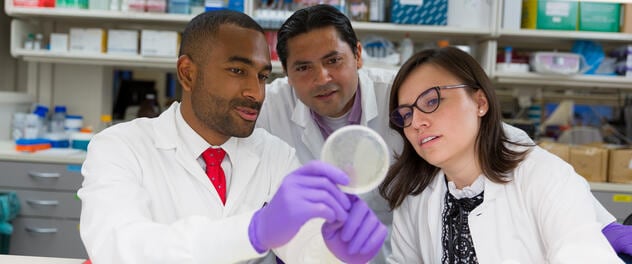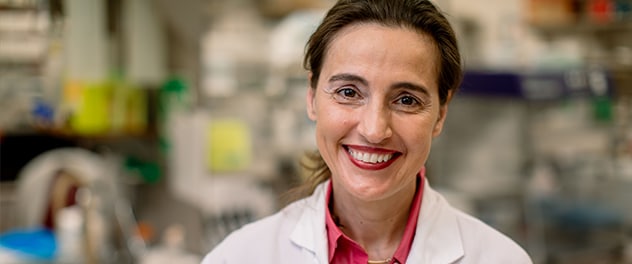3 Sites, 1 Comprehensive Cancer Center
-

Research programs of Mayo Clinic Comprehensive Cancer Center:
Seeking a better understanding of cancer biology; discovering new ways to predict, prevent, diagnose and treat cancer; transforming quality of life. Explore cancer research programs.
-

SPOREs of Mayo Clinic Comprehensive Cancer Center:
Translating scientific findings into clinical advances for patients; intensely focusing on cancer disease types; collaborating across multidisciplinary groups. Learn about these specialized cancer research areas.
At Mayo Clinic Comprehensive Cancer Center, a culture of innovation and collaboration is driving research breakthroughs that are changing approaches to cancer prevention, screening and treatment and improving the lives of cancer survivors.
Designated as a comprehensive cancer center by the National Cancer Institute, Mayo Clinic Comprehensive Cancer Center is defining new boundaries in possibility, focusing on patient-centered care, developing novel treatments, training future generations of cancer experts, and bringing cancer research to communities.
The Cancer Center has a robust profile of discovery that has pushed out the horizon of hope. Among our exciting research success stories:
- Advancing CAR-T cell therapy, enabling Mayo Clinic to become one of the first centers in the U.S. offering CAR-T cell therapy as a clinical treatment. Learn about the CAR-T Cell Therapy Program.
- Driving research behind the Proton Beam Therapy Program at Mayo Clinic, which exclusively features intensity-modulated proton beam therapy with pencil beam scanning. Learn about the program.
- Developing Cologuard, the stool DNA test co-developed by Mayo Clinic and Exact Sciences Corp. and now a colorectal cancer screening tool recommended by the U.S. Preventive Services Task Force. Read more about the stool DNA test.
- Leading the International Duration Evaluation of Adjuvant Chemotherapy (IDEA) collaboration study, which showed that for patients with low-risk stage III colon cancer, a shortened course of oxaliplatin-based chemotherapy after surgery was associated with reduced side effects compared with the traditional course of chemotherapy and was just as effective.
- Demonstrating through the Breast Cancer Genome-Guided Therapy (BEAUTY) study that the most common genetic changes were not more commonly observed in chemotherapy-resistant tumors compared with chemotherapy-sensitive tumors. Read more about the study.
- Creating a new approach to classifying gliomas, which led to the development of a test that helps oncologists determine who needs to be treated more aggressively and who might be able to avoid certain therapies. Learn more about brain cancer genomics.
With campuses in Phoenix/Scottsdale, Arizona; Jacksonville, Florida; and Rochester, Minnesota, Mayo Clinic Comprehensive Cancer Center has a broad geographic reach, enabling it to serve diverse patient populations around the world. The campuses are also home to outstanding physicians and scientists who collaborate across the full spectrum of cancer research, from basic biology to treatment.
Innovative research. Risk reduction. Better treatments. Improved cure rates. Compassionate care. These are some of the foundations on which we've built our international reputation as a leading hub of cancer research and treatment.